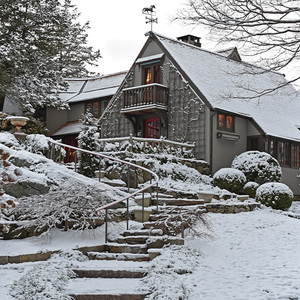Have a well drained site, well above water table, and need to choose waterproofing. Air gap (Delta MS “dimples”) system appeals because it let’s the whole structure breath. Will be using basement for living. General theory around these parts (bay area) is Bentonite (Paraseal). I know it’ll block out all the water but it’ll do it in both directions. Opinions?
-Aaron















Replies
I assume you are talking about masonry walls.
'Breathing' is not really a design issue. Those dimple systems are primarily meant to allow exterior water to drain into the footing drains, not to allow interior water to escape.
Any water inside would either have come from outside, or from condensation.
Use drainage and waterproofing to keep groundwater out, vapor barrier to keep vapor from passing through floor and walls, and insulation to prevent condensation on cold concrete surfaces.
The water inside I'm talking about would be from the concrete itself in the first few years or from condensation (due to temperature variation from heating the basement.) What system do you use?
I designed one with a spray-on membrane that has held up perfectly. It also has 2 inches of foam board below grade both to insulate the wall and to protect membrane.
Termites were not an issue in that climate.
Some folks say sheet membrane products are better, because they will span a crack if one opens up. Even the spray-on products have pretty good elasticity, however.
Bet either would perform well in your low-pressure situation.
I doubt you need to be concerned about the concrete curing water when selecting waterproofing.
Condensation would not find its way out through the concrete wall anyways. It's going to eventually evaporate into your living space.
Also have a look at http://www.xypex.com, it might be what you're looking for if this is going to be all new concrete.
-- J.S.
My builder used the peel and stick rubbery stuff, basicly like ice and water shield used on roofs, except made for direct burial. It worked really great. It totally isolates the concrete from contact with moisture, so none wicks into the wall from the damp soil, and spans cracks well.
I saw bentonite used once and it seemed to prevent leakage of liquid water, but I don't believe it prevents wicking dampness from the soil as other systems would.
Wayne,
If you are above the water table the bentonite will not be as effective. It works best in submerged conditions. As stated already, it will not prevent wicking conditions. For residential construction above the water table, Xypex as a concrete additive may be worth the cost.
...that's not a mistake, it's rustic
Edited 10/2/2003 12:39:25 AM ET by Bungalow Jeff
If interior water vapor is a concern just go by a small dehumidifier for the space and monitor how much you get.
They have ones that turn off when the small, ( 2 gal? ) tank is full so it won't be a problem.
As it turns out, my local building department only will allow hot-mopping or we can request they consider something with an ICBO #. The common stuff (Bituthene, Bentonite sheets) don't have that testing! The discussions continue....
If you're going beyond their standard they should let you choose.
Hot mopping seems like a pretty old and inadequate method.